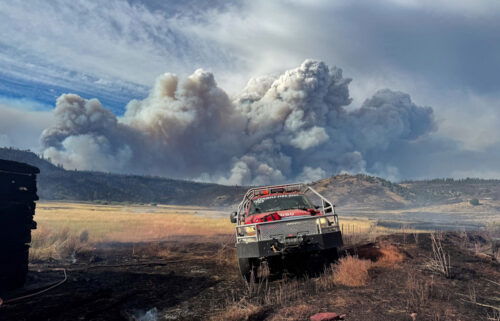Fully vaccinated cancer patients have a 13 per cent mortality rate if they catch COVID-19, study suggests
By Alexandra Mae Jones
Click here for updates on this story
TORONTO (CTV Network) — Cancer patients remain at a much higher risk of hospitalization and death from COVID-19 even if they are fully vaccinated, according to a new, small-scale study.
The study, published Friday in the journal Annals of Oncology, found that cancer patients had a 13 per cent mortality rate if they suffered a breakthrough infection.
The study was conducted by the COVID-19 and Cancer Consortium (CCC19), a group of 129 research centres which have been tracking the virus’ impact on cancer patients. This is the first study to investigate the risk levels for cancer patients who experience breakthrough cases, researchers say.
“Patients with cancer who develop breakthrough COVID-19 even following full vaccination can still experience severe outcomes, including death,” Dr. Toni Choueiri, director of the Lank Center for Genitourinary Care at Dana-Farber Cancer Institute and a senior author on the report, said in a press release. “That is why a multilayered approach that includes masking and social-distancing, along with vaccination plus booster against COVID-19 remains an essential approach for the foreseeable future.”
The study used data collected by the CCC19 through an international survey run on their website, focusing on those with current or prior cancer and a lab-confirmed case of COVID-19 between November 2020 and the end of May 2021.
A total of 1,787 patients with cancer had contracted COVID-19 in that time period, with most of them being unvaccinated.
Only 54 patients were fully vaccinated when they contracted the virus, with full vaccination being counted as those who had two shots of the Pfizer-BioNtech or Moderna COVID-19 vaccine, or one shot of Johnson & Johnson jab.
Of those who had a breakthrough case, 65 per cent had to be hospitalized, 19 per cent were in the ICU on a mechanical ventilator, and 13 per cent died of the virus within 30 days.
Although researchers noted that the study had a small sample size and thus may not be fully accurate, a 13 per cent mortality rate for breakthrough cases in cancer patients is still significantly higher than the mortality rate for the average population. According to Canadian data, more than 88,000 people have contracted COVID-19 while fully vaccinated, but only 1,017 of those people have subsequently died of the virus, which comes out to a mortality rate of around 1.14 per cent.
Researchers noted that previous research has shown that cancer patients may not be able to produce the same immune response as the average person when vaccinated.
One study from June found that antibody levels were significantly lower in those with blood cancers as opposed to those with solid tumours.
“Because measures of immunity are not routinely collected in clinical care, we don’t know whether these were patients who mounted effective immune responses after vaccination; a lot of emerging data have suggested that patients with cancer, especially blood cancers, don’t mount adequate protective antibody responses,” Dr. Jeremy Warner, director of the CCC19 Research Coordinating Center and a senior author of the new study, said in the release.
He also noted that their study found that the presence of other risk factors in a patient, as well as whether their cancer was active and progressing or not, increased their risk of mortality.
“It’s important to note that many of the same factors that we identified prior to the availability of vaccination – age, comorbidities, performance status, and progressing cancer – still seem to drive many of the bad outcomes,” he said.
The study appears to support previous research which found that those with blood cancers are at higher risk from COVID-19. In both the vaccinated and unvaccinated patients involved in the new study, ICU and hospitalization rates increased if patients had a blood cancer as opposed to solid tumours.
The new study also found that of the fully vaccinated cancer patients, 46 per cent had reduced levels of lymphocytes, which are a type of white blood cell that are important to the immune system.
Having lower levels of these types of cells is called lymphopenia, and it is common in patients receiving certain types of cancer treatments, such as treatments for lymphoma and leukemia. Patients in both the vaccinated and unvaccinated groups who had lymphopenia had higher rates of ICU and hospitalization than other patients, according to the study.
Due to the small size of the new study, researchers say they can’t pinpoint which anti-cancer treatments might be associated with breakthrough infections or which worse outcomes from a breakthrough infection.
“Similar results (high mortality rates among fully vaccinated individuals) have been reported in other immunocompromised patient populations, such as organ transplant recipients, prior to the utilization of additional vaccine doses,” Dr. Dimitrios Farmakiotis, an infectious disease clinician at the Warren Alpert Medical School of Brown University and a senior author of the study, said in the release.
Researchers say the study results emphasize how important it is to not only get vaccinated, but to implement a multi-pronged response to protect those at higher risk, including cancer patients.
“These findings come at a time of concerns that immune escape mutants such as the Omicron strain may emerge from chronically infected patients with weakened immune systems,” Farmakiotis said. “Thus, the immunosuppressed and their close contacts should be target groups for therapeutic and preventive interventions, including community-level outreach and educational efforts.”
Please note: This content carries a strict local market embargo. If you share the same market as the contributor of this article, you may not use it on any platform.
Sonja Puzicsonja.puzic@bellmedia.ca



